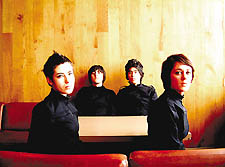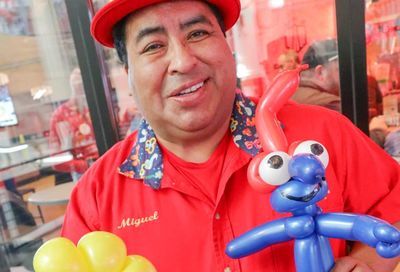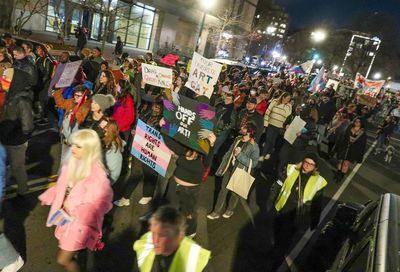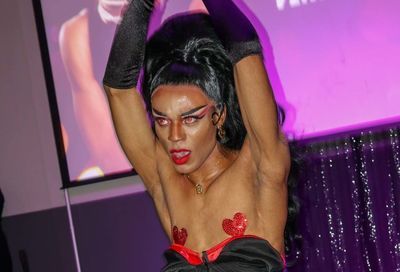Electro's Generator
Ladytron
 |
Danny Hunt offers an uncharacteristically simple explanation for electro’s elevation as our era’s most creative dance style. Electro — or electroclash if you prefer — is the unexpected revival of 1980s post-disco, post-punk, and New Wave synthpop, all rolled into one ultra-modern, mostly danceable genre. To Hunt, it’s simply a matter of our cyclical world, where trends come and go and come and go again in a continuous loop. “Sounds take a while to become palatable again,” Hunt says. “There’s always a period when older sounds aren’t usable.”
What’s odd about Hunt’s simple claim is not its obvious element of truth. It’s the perch from which he makes it. Hunt is the lead member of Ladytron, and there’s little that could be called simple about this British group. The foursome usually dress military-style, in all-black denim, and they create occasionally dissonant music through gradually built layers of elements, which often come and go at unexpected moments. Heavy on electronics and brooding sonics with an aloof attitude, the music still has an intensity of feeling. Hunt and band mates Reuben Wu, Mira Aroyo and Helen Marnie gave shape to electro with their first album, 2001’s 604 (EmperorNorton), which inspired the rest of today’s electro architects to action. By the time Ladytron released its far-superior and better-selling second album, Light & Magic (EmperorNorton), electro was all the rage in London and stepping to the beat stateside.
How did the ’80s, of all decades, get revived now? What provoked Ladytron to create a musical army of affected, angst-ridden technocrats? New Order and Echo and the Bunnymen are obvious musical influences, and Hunt cites them as his youthful favorite bands. Hunt, 28, was barely a teen when his musical forebears were at their peaks. But he can remember popular music from his early childhood.
“Everyone growing up in the ’80s was influenced by the music,” Hunt says. “The ’80s seemed quite optimistic, especially as a young kid. Even though it was for shit.”Â
Hunt chalks up the sharp contrast between the earnest naïveté of ’80s pop and a far more sobering reality as “one reason people of our age group are making this kind of music.” Not only are the other three members of Ladytron (named in homage to the ’80s group Roxy Music) in their mid-20s, but so too are essentially all the major players in electro. Electro is a revival of sounds and sensibilities that these artists grew up with, in a time even more anxious and fraught with peril than the Cold War jitters.
“People say our music has no feelings, that it’s robotic,” Hunt says, “but that’s not true. Maybe people project an attitude on us based on how our music is presented. Or because we’re not histrionic.” Hunt calls Ladytron’s music “softcore techno,” and with Light & Magic, the group is even more softcore than on 604. But the inscrutable Ladytron doesn’t offer much help in understanding its music. Did you wonder about the end of the video for “Seventeen,” in which only one schoolgirl remains in the room as her classmates are shuffled next door? Don’t look to Hunt for an answer, since the video is intentionally ambiguous: Was the lone girl the only one picked or the only one rejected? Precisely, says Hunt. “We didn’t want a video that just portrayed the song,” which is a lyrically angry missive at our culture’s obsession with youth.
Ladytron takes an intentionally ambiguous stance about everything pertaining to it. Hunt sounds almost shocked that there “are a lot of urban myths” about the group, but the tales are largely of his own making. When interviewed, Hunt is studiously silent on most matters of Ladytron’s music. He won’t talk about the idiosyncratic lyrics: “I think it destroys its power to talk about them,” he counters. He laughs off talk about any of the music: “It makes you sound ridiculous.” And he won’t reveal anything about the group’s upcoming performance at the 9:30 Club. All Hunt volunteers is that his is “not a laptop band. It’s not all sequenced. When we play people will see that we really do play instruments.”
Hunt relates a new urban myth about Ladytron. A DJ in Australia, after playing Ladytron’s “Seventeen,” misidentified the band as t.A.T.u., telling his listeners that Aroyo and Marnie are Russian lesbians. (Though Hunt says they’re often thought to be gay, no one in Ladytron is.) The two groups are quite different, but both could be called throwbacks to ’80s pop with a modern twist: Like Ladytron, t.A.T.u. crafts mesmerizing, moody pop as it often sings about social injustices or human failings. So maybe the ’80s music revival is less about nostalgia and more about a much-needed corrective against conspicuous consumption, about purported evils in the world. Maybe the real evil is hidden in plain sight. We’re just too distracted by all the — as Ladytron has it — light and magic.Â
Ladytron performs with Simian on Monday, Feb. 17, at the 9:30 Club, 815 V Street, N.W. Doors open at 7:30 p.m. Tickets are $15. Call 202-393-0930. Visit www.930.com.
Support Metro Weekly’s Journalism
These are challenging times for news organizations. And yet it’s crucial we stay active and provide vital resources and information to both our local readers and the world. So won’t you please take a moment and consider supporting Metro Weekly with a membership? For as little as $5 a month, you can help ensure Metro Weekly magazine and MetroWeekly.com remain free, viable resources as we provide the best, most diverse, culturally-resonant LGBTQ coverage in both the D.C. region and around the world. Memberships come with exclusive perks and discounts, your own personal digital delivery of each week’s magazine (and an archive), access to our Member's Lounge when it launches this fall, and exclusive members-only items like Metro Weekly Membership Mugs and Tote Bags! Check out all our membership levels here and please join us today!



















